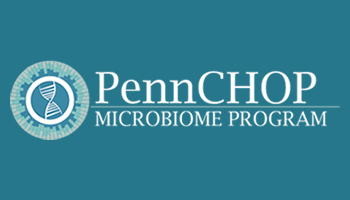HOW CAN WE HELP YOU? Call 1-800-TRY-CHOP
About PennCHOP Microbiome Program

The PennCHOP Microbiome Program supports research across a wide spectrum of topics, with the goal of devising methods for improving human health by manipulating microbial populations.
The PennCHOP Microbiome Program consists of six cores: The High-throughput Sequencing and Analytical Core are located within the CHOP Microbiome Center, and the Gnotobiotic Mouse Core, Acute Biobanking Core, High-Throughput Screening Core, Microbial Culture and Metabolomics Core, and the Microbiome Human Intervention Core are located at the University of Pennsylvania.
Why support microbiome research?
Methods for studying the microbiome have greatly improved in recent years, leading to an explosion of new research. In particular, the development of extremely high-throughput DNA sequencing methods has allowed characterization of mixed microbial communities using DNA sequence information. This allows quantification of communities at specific body sites in different people, which has shown that humans can be quite different from each other. These methods also allow researchers to investigate changes in the microbiome associated with disease states.
What is a microbiome?
The human body is a community of organisms, more like a coral reef than a single fish. Numerous microbes inhabit our bodies, and as with organisms on a reef, some are mutualists, helping the reef grow and prosper, some are neither helpful nor harmful, while others are pathogenic and degrade the reef material.
The bugs living in association with humans contribute a pound or two to the weight of a healthy adult. It is as though a new organ has been discovered, made up of microbial cells and not human cells. The bulk of these organisms are in the gut, but many body sites are colonized by microbes, which form distinct communities at each location and contribute numerous biological functions. Some are important in health, such as promoting proper immune development and aiding digestion. Others harm the human host and cause disease, such as heart disease, cancer, diabetes, inflammatory bowel disease, autism, and obesity, to name a few.